
Embracing Responsibility for Change#
When we say nowadays the surrounding is corrupt,
we need to ask: where does this surrounding start?
At my heart, skin, bedroom, flat, apartment, district, state, etc.?
We need to ask ourselves how we reached the conclusion
that it was not corrupt earlier.
We need to ask ourselves what we are doing,
apart from adding to that corruption at our own level.
If I am not part of the solution,
then there is a high chance I am part of the problem.
We commonly hear in society,
“Nowadays, wives don’t behave properly with their husbands
because new-age girls are like that.”
“In earlier times, our mothers or grandmothers
were very careful and skillful in their talking and handling of situations.
They respected their husbands, their families, and their culture.”
A similar kind of narrative is heard for husbands as well.
We also hear that,
“Nowadays, most people are living alone,
so they want a partner,
and this partner culture has emerged.
Sometimes these partners are pets; other times, humans.
Partnership is temporary.
People maintain it as long as they like,
and separate when they want.
Our society has become like this.”
“Nowadays, milk is not pure;
there is mixing in everything, so milk is no exception.
People are money-minded.
They want to earn more in less time.
Society has become focused on money and profit.”
“Now Kalyug has come.
Children are careless and disrespectful of their parents.”
“Nowadays, parents don’t care for their children;
they just want to enjoy life.
And when children come in their way,
they are handed over to caretakers at home, hostels, or schools.
Parents don’t have time to teach or play with children.
TV and video games are teaching them,
and schools and fellow children are teaching them whatever they want.
Children are learning whatever they can.”
“Nowadays, people are keeping more pets,
and barking is normal in every flat or home.
If you have a thousand flats in your society,
at any time, some pet will be crying from some balcony.”
“It is natural. It has to happen.
People get sick, so what can be done?
People die; everyone dies one day, so what can be done?”
“It is natural to have cancer or diabetes nowadays.
It is because our lifestyle has changed, so what can be done?”
With these kinds of observations and data points from
newspapers, TV, social media, etc.,
we need to introspect: what are we doing?
We are accepting this as normal.
Accepting a temporary situation is not a problem,
but accepting that all of this is natural, and will remain like this,
is surrendering to the circumstances while complaining about them.
Accepting Dukkha as a normal and permanent part of life,
accepting that there is no solution,
is not good.
Ask yourself: what is your contribution to this entire supply chain?
Are you a part of it or standing away from it, just watching?
Being a part of the supply chain means adding value and strengthening it.
Is there any option?
Sometimes, yes, it is readily available.
Sometimes, we need to think and create one.
But complaining and expecting that the good news of change to Satyug
will come from newspapers, YouTube, WhatsApp, or TV is unrealistic.
It will never happen, even if we live thousands of years on this planet.
You take responsibility and change yourself silently.
Without any broadcast, social media post, hoarding, or drama.
And now things are done.
Satyug has come.
Sometimes, you need a few resources to create
that environment where you can take responsibility.
But most of the time, it is available.
We need to choose:
Not to suffer.
Not to complain.
Not to fix the outside when it can be fixed from within.
O Chaitanya, I take your all arguments that,
Society is a problem, people are a problem,
relationships are a problem, culture is corrupt,
Dharma is lost, your neighbor is irritating,
neighboring countries are a problem,
the boss is a problem, the job is a problem,
competition is a problem, and the chain is endless.
But ask yourself: are you also a problem?
If the answer is yes, then fix that first.
For that you don’t need anything else.
If the answer is no, then go blissfully and help others.
When you are not a problem, you can take responsibility for change.
Perhaps you can fix it,
Without expecting any award or recognition,
as you are already blissful.
Hari Om Tat Sat
Yours Truly Hari
Hashtag#
#PersonalResponsibility #ChangeFromWithin #SelfReflection #SocialChange #Accountability #InnerGrowth #FixingSociety #ModernLife #Satyug #Kalyug


Comments: